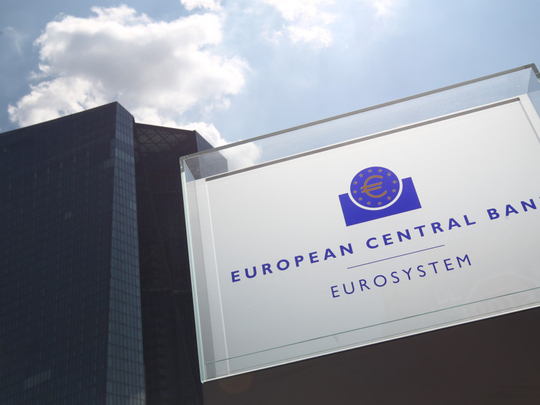
So the euro is doomed. If one is to believe mainly Anglo-Saxon columnists and economists this is what the Greek drama has laid bare. For them, the common currency is about to founder on either built-in flaws or German intransigence (or both).
One almost senses an “at last” as they have been sounding the Euro’s death knell ever since the first Greek bail-out programme in 2010. Surely, there is no denying: The Eurozone has been in crisis-mode for years now and it, too, is not immune to Murphy’s (semi-) law that what can go wrong will go wrong. But while the crisis has reached a new climax over the Greek issue, predictions of the euro’s imminent death are, to paraphrase Mark Twain, vastly exaggerated.
To start with, even Nobel Prize economists are not immune to Murphy’s law either. How could they be since economics is not an exact science governed by laws of nature. If it were otherwise, we would be out of the woods by now through an application of fail-safe economic recipes. So whoever peddles such recipes should be met with a healthy dose of skepticism because the Eurozone is an experiment unprecedented in modern times.
This uniqueness offers a first reason to be cautious about prophesying the euro’s demise. And the very fact that the euro has, up to date, survived a crisis of an extraordinary magnitude on any economic Richter scale should give one pause as well.
The euro’s resilience is explained for by its dual nature of being an economically sensible as well as a politically motivated project. In economic terms, a single currency completes the European single market and makes it more efficient by lowering transaction costs and increasing price transparency because there are no more currency fluctuations. Thus, cross-border mobility of goods and services, capital and labour are made easier which, in turn, stimulates competition and innovation, broadens capital markets and improves consumer choices. For these reasons, the United States has the dollar as its nation-wide currency rather than each American state having its own currency.
But the euro is more than an economic instrument. From its very inception, it has also been an economic means to a political end. Very much like the single market itself. For the major impetus for what in 1957 began as a European Economic Community (EEC) was political peace through economic integration. In this regard, what evolved into the present European Union represents a paramount example of man being able to learn from history, namely Europe’s recurrent cycles of national rivalries escalating into wars. Not only, but crucially thanks to a triad of mutually beneficial interdependencies, joint action and solidarity war or even the threat of it among member states of the EU has become inconceivable. The euro has been created to reinforce this historic achievement. Yet today this is no longer its only, perhaps not even its primary, political mission. A globalised world of both ineluctable risks and irresistible opportunities requires rules to be set and enforced collectively. In such a world, an integrated Europe makes its member states more sovereign by enabling them to exert global influence they no longer have as individual nations. Thus, the euro is an economic instrument to enhance Europe’s global political clout.
Well, so much for the theory and motivation. The euro as not only an economic project but also a means to fortify Europe’s peace and to enhance their members’ sovereignty may explain why euro doom-mongers have got it wrong so far. But don’t they have a point that the euro has become a Procrustean Bed that is in danger of tearing Europe apart?
Yes, they do. A means that is not fit for purpose can cause more harm than good. As the crisis has shown, the Euro or the so-called “Economic and Monetary Union” (EMU) suffers from being a union with a capital “M” and a small “e”. The Eurozone has a common currency and a common monetary policy set by the European Central Bank (ECB). What it still has to develop is a fully-fledged economic union consisting of a collective authority similar to the ECB, financial institutions that are regulated efficiently as well as national fiscal and economic policies that comply with agreed rules and provide for national competitiveness.
Significant progress
However, the Greek case should not lead one to throw out the baby with the bathwater. Eurozone members have made significant progress in capitalizing the “e” in EMU through a fiscal and banking union. In addition, they have set up and disbursed funds to support members in need. Likewise, the ECB has intervened massively and successfully to stabilise the Eurozone. In this way, the Euro union has weathered the storm of a global crisis that originated in the US and a home-made crisis caused by the Euro’s design flaw. And it works: Countries that have had to resort to bail-out programmes are well on their way to recovery.
As the “anchor of the Eurozone” (IMF), Germany has been a leading player in all this. We neither sought this role nor do we rejoice in it. We know the job of building a robust and flourishing Eurozone is not done yet, and we don’t pretend to be error-free. But we are also acutely aware that while we are global traders, our economic base and political home is a Europe united in peace and solidarity. For its own economic and political well-being, Germany needs strong and prosperous European neighbours. Germany alone cannot create such a neighbourhood but we will continue to do our level best to attain and sustain it.
Dr. Eckhard Lübkemeier is Ambassador of the Federal Republic of Germany to the UAE.










